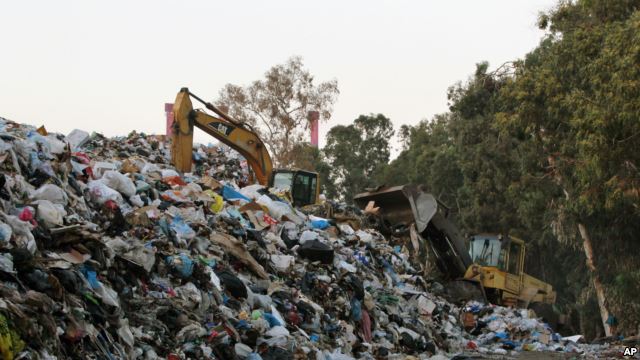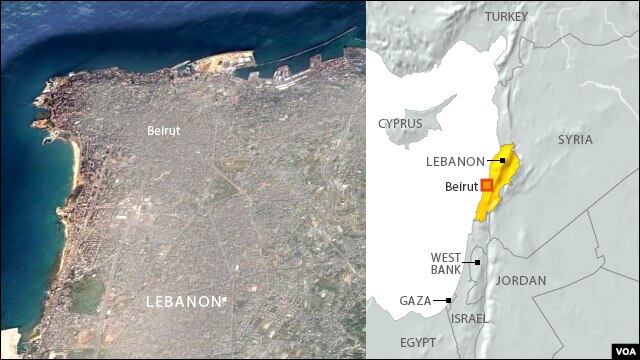
John Owens – VOA
The onset of Lebanon’s rainy season has heightened fears that the country’s growing mountains of trash could spark a public health crisis.
This week, the government set up a taskforce on the issue, responding to concerns that garbage left rotting in the open could lead to a spike in illnesses. Some health activists warn the trash could even lead to a re-emergence of cholera.
Protesters marched in Beirut again last week, demanding the government find a way to get rid of the trash, which has not been picked up in more than three months.
Growing unease
“I’m concerned about my child, about my family, about my neighbors” explained Beirut resident Ali Tay, who has a nine-month-old daughter.
The protests are the latest in a series of demonstrations, initiated by the You Stink movement, against a crisis that has dragged on since mid-July.
With rubbish left uncollected in many parts of Beirut and beyond since the over-stuffed Naameh landfill was closed, the government has continued to search for new, secure ways to dispose of the trash but found none.
The latest idea – to set up a new landfill along the coast for Beirut and Mount Lebanon’s trash – unraveled amid local opposition.
Protests are not the only sign of growing unease. Concerned citizens have been circulating leaflets warnings of the health dangers, and using WhatsApp to warn people not to eat in restaurants and to avoid eating fresh vegetables.
“Beirut is an unhealthy place, even before the garbage issue,” added Tay. "Now, it’s even more of a disaster.”
A briefing issued by the World Health Organization in September warned of a wide range of possible health impacts, from respiratory problems, headaches and cancers in the case of long term exposure. Of “major concern,” it adds, is water pollution.
The coming rains
Now, a situation already labeled a potential “health catastrophe” by health minister Abu Faour in August threatens to grow worse with the rainy season arriving, bringing with it the threat of water pollution.
Video allegedly showing uncollected garbage swept down a flooded street in Beirut recently was widely shared on social media.
“The rainy season has come,” said Dr. Abdul Rahman Bizri, a specialist in infectious diseases who is a part of the new government taskforce. “Unfortunately, despite major investment in infrastructure which has cost the country billions, the infrastructure doesn’t work.”
Rain could once again overwhelm sewers and flood surrounding areas, spreading bacteria and raising the risk of contamination of food or water supply, he stated.
Along with its newly-issued recommendations, which include preventing the burning of waste and the dumping of rubbish in rivers, the taskforce has called for increased checks to ensure there is no bacterial contamination of the country’s water system.
The dangers of groundwater contamination caused by rain and flooding could be exacerbated by the widespread use of private wells in Lebanon, added environmental consultant Naji Chamieh.
Chamieh expressed concern about industrial and medical waste in particular.
“Every day you have around 3,000 tons of waste going somewhere,” he told VOA. “Where is it going? Someone needs to map this stuff.”
Cholera
Broader reports of the return of cholera to the region are further stoking anxiety.
UNICEF said Friday that an outbreak of the food and water-borne disease in Iraq, where it has killed six, had spread to Syria, Kuwait and Bahrain.
Before the trash crisis, Bizri had warned in local media that the number of pressures upon the already-frail healthcare system, including the strain of hosting well over 1.1 million Syrian refugees, made epidemics more likely.
Though the trash crisis was unlikely to cause cholera, it could enable its return, he told VOA.
“Lebanon is not in imminent danger of cholera because of garbage,” he said. “It’s in imminent danger because of the risk of importation from Iraq or Syria, and with the infrastructure really straining, rubbish could be an exaggerating factor.”
Still speculation
Others remain skeptical that the trash will spawn a major health crisis. Initial studies into the matter had not found anything unusual, says Bizri.
Dr. Salim Adib, a public health specialist, dismissed fears over cholera, as well as talk among some of the plague returning.
“There’s been a whole lot of hype and panic” over the issue, he told VOA.
Such words will do little to reassure those like 25-year-old Anthony Sargon.
Sargon has attended protests with a placard emblazoned with a warning borrowed from the TV show Game of Thrones —
"Winter is Coming. So is cholera."
“If it’s not cholera, it’s the food, it’s the air. These diseases would affect everyone.” he said.
And with the You Stink movement attracting dwindling numbers, he fears the pressure is easing off government to deal with the crisis.
Informed about the creation of a taskforce to advise on the government on health risks, he scoffed.
“They’re still burning mountains of trash every day, and all we can do is close the windows," he said. "I’ll believe it when I see results. I just hope when it starts raining again people will wake up to the threat.”




